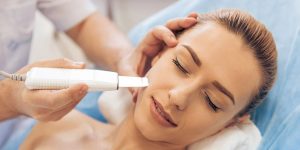Acne

According to the American Academy of Dermatology, Acne is the most common skin condition in the United States. Although it’s common, accurate information about acne can be scarce. Acne is not just a problem for adolescents. Many adults are affected by acne, which can have negative psychological effects on one’s self-esteem.
At DermGroupNYC, you will be seen by one of our Board Certified Dermatologists who have many years of experience treating acne patients of all ages, children through adults, men and women. Whether it’s severe acne, hormonal acne, food-related acne, you name it, we have seen it and treated it and made it better.
Our team of licensed skin care professionals has been helping patients treat both active acne outbreaks and the scarring that can result from lesions. We want to help you feel better about your complexion and ultimately, about yourself.
There are various methods for treating Acne and Acne Scarring such as Cortisone Injections, Laser Treatments, Medical Acne Facial, Photodynamic Therapy, Blue Light Red Light Treatment, and FAST+ PRP for Acne Scars.
Beyond the actual treatment options, at DermGroupNYC we also want to help you create a skin care regimen that works and leads to healthier skin, acne-free skin.
Our board-certified dermatologists will select the correct treatment for your skin type — contact us for a consultation.
Rosacea
Rosacea is a skin disease that affects people over the age of 40 and is common in fair-skinned people. It causes redness on cheeks, forehead, chin, and nose. Rosacea can cause burning and soreness in your eyes. Some people get little bumps and pimples on the red parts of their faces. It can worsen in time if left untreated and is also often mistaken for eczema, acne, or some other skin allergy.
There are four different types of Rosacea: Vascular, Inflammatory, Phymatous and Ocular Rosacea.
It is important to have an evaluation of redness of the face since there are several possible conditions that can cause this, some of which may be serious, and early evaluation and treatment can make a very big difference in outcome.
Rosacea is generally treated by avoiding factors that aggravate it, such as emotional stress, sunlight, hot beverages, spicy foods, alcohol, and extremes of hot or cold. Another way to treat rosacea is to use a prescription topical medication.
Those who suffer from rosacea should also use sunscreen at all times. Your doctor may recommend a combination of oral antibiotics and topical medications.We have several new treatments available for caring for this condition. Surgical treatment may be required for treatment of rhinophyma (also known as phymatous rosacea). Also, laser treatment is very effective for treating any broken blood vessels. This may improve any acne-like lesions.
Frequently Asked Questions
Does stress cause acne?
Stress is commonly blamed for the development of acne. Stress can have many physiologic effects on the body, including changes in hormones that may theoretically lead to acne. In some cases the stress may actually be caused by the acne lesions, not the other way around! If the acne is being treated effectively, stress is not likely to have much impact on the majority of people.
The time for improvement depends upon the product being used, but in almost all cases it is more a matter of weeks or months instead of days. Most dermatologists would recommend the use of a medication or combination of medications daily for 4 to 8 weeks before they would change the treatment. It is very important for patients to be aware of this time frame so they do not become discouraged and discontinue their medications. Conversely, if you see no change whatsoever, you might want to check with your dermatologist regarding the need to change treatments.
What is the best way to treat acne?
Everyone’s acne must be treated individually. If you have not gotten good results from the acne products you have tried, consider seeing a dermatologist. Your dermatologist will decide which treatments are best for you. For more information about the types of acne treatments that are available, and for basic acne treatment guidelines, please see Acne Treatments in the main part of AcneNet.
How long before I see a visible result from using my acne medication?
The time for improvement depends upon the product being used, but in almost all cases it is more a matter of weeks or months instead of days. Most dermatologists would recommend the use of a medication or combination of medications daily for 4 to 8 weeks before they would change the treatment. It is very important for patients to be aware of this time frame so they do not become discouraged and discontinue their medications. Conversely, if you see no change whatsoever, you might want to check with your dermatologist regarding the need to change treatments.
We Can Help You
Call us to schedule your appointment today at (212) 673-5633 or visit us at one of our conveniently located New York offices to learn more about our extensive line of cosmetic dermatology procedures and how they could transform your appearance.

